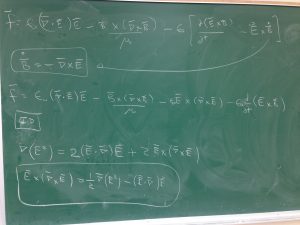I was recently promoted to full Professor of Physics at Cal Poly. I joke that, nearly 50, I’ve finally grown up and got a real job. This was roughly a thirty year project from starting my freshman year as a physics major at San Jose State in 1986, through my masters degree, through my Ph.D. at UC Davis, through three postdocs, through a tenure-track probationary period at Cal Poly, through a tenured Associate Professor position, until finally as a full Professor in the fall of 2016 at Cal Poly.
In my case for promotion, I had to submit a teaching philosophy, which I would like to share here. The ideas in it are not new; I don’t claim to have invented them. Moreover, they are not cited because, in some ways, they are rather ordinary, blending into the background mythology of teaching culture. However, I feel that the particular personal way I have presented the ideas is perhaps worth sharing. The essence can be summarized as this: “Like I began, I have applied my own teaching principles to my own journey in learning how to teach.”
Statement of Teaching Philosophy
In my nine years at Cal Poly, I feel I’ve grown as a teacher and mentor. However, this newfound wisdom also makes me question my own growth; I now know how little I know whereas, when I started, I thought I had it all figured out. As someone not formally educated in Education, here are some of the things I’ve learned.
I believe education is important, but its success and purpose are difficult to quantify.
Education generates understanding of the world, removes ignorance, and allows us to face the future with courage and dignity.
But setting aside abstract philosophies of education, my conclusion is that a successful education is one where a student discovers their own definition of success and develops the skills to pursue it. My particular specialty is physics, but I’m also human. If I facilitate this process by providing some skills and focus though my physics and my humanity, both in and outside the classroom, then I have been a successful teacher and mentor. I have helped guide many students through the struggles of the technical, day-to-day details of coursework, mentored them as they find their career path, and consoled them in their struggle to find out who they are as a person.
A successful education is one where a student discovers their own definition of success and develops the skills to pursue it.
Helping physics students find their own definition of success and finding the corresponding skill set to accomplish this has been challenging for me. But it is a challenge I have committed my life to and embrace with aplomb. In physics, one of the biggest barriers to promoting student success is also one of its greatest strengths: physics is both very generalized and yet fundamental by nature. Physics involves scientific ideas spanning about 30 orders of magnitude in space and time – from the quantum world to the cosmos and everything in between. It is a daunting task to prioritize these ideas for undergraduates and generate practical skills while also imparting rigor, problem solving, and deep understanding of fundamental concepts about the nature of reality. In my own work, I continue to experiment with different teaching styles and techniques, but have settled into what might be called the “traditional method” of lecturing enthusiastically at a board with chalk, asking them questions in class, giving regular exams and quizzes with quick feedback, and being available to students in and out of class, either online or in person. This path has allowed me to optimize my own ability to convey to students my enthusiasm for physics and to coach them in a positive, constructive way through the learning process. Feedback from students indicate they genuinely appreciate this.
Being satisfied and fulfilled as an teacher is a critical part of the student’s success and learning process.
The future will always require good teachers to engage and inspire students face-to-face.
A teacher gives a student a foothold into a complex topic and helps them initiate the learning process.
A teacher can facilitate learning and guide the process, but cannot be responsible for it.
One role of a teacher is to, without sacrificing rigor, promote student satisfaction and to inspire students to learn more about a topic for the rest of their lives.
So, like I began, I have applied my own teaching principles to my own journey in learning how to teach. By doing so, I have learned how little I knew. I have defined my own success and pursued the skills to attain it. I have taken initiative in generating and expanding my own learning process. Without compromising rigor, I have also found satisfaction in the experience of teaching, inspiring me to continue learning about it the rest of my life. This experience, I hope, makes a difference to my students and allows them to find their own successful paths.

